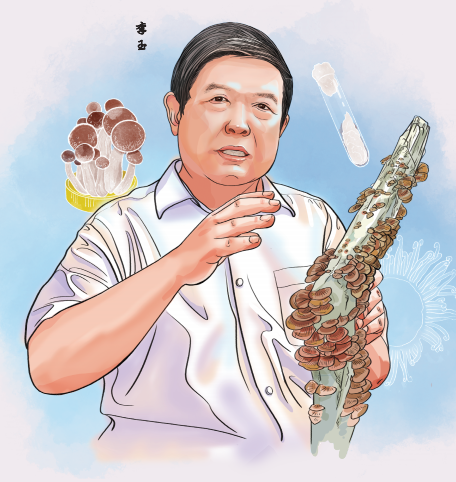Li Yu, 78

Li Yu, 78 [Illustration by Yang Liu and Li Xiaotian]
A world-renowned mycologist who specializes in engineering and industrialization of fungi science and edible fungi. He is an academician at the Chinese Academy of Engineering and the president of the International Society of Medicinal Mushrooms. His research has made substantial contribution to China's poverty alleviation effort, lifting hundreds of villages out of absolute poverty. In 2021, he received the honorary title of National Poverty Alleviation Models for his success in poverty eradication.
One intriguing fact about China's historic victory over extreme poverty is that part of its foundations were built on edible fungi and decades of innovative research.
Revitalizing rural China, promoting green development and pushing the envelope to better research and serve the nation's strategic needs are themes highlighted in the 14th Five-Year Plan (2021-25).
Li Yu, a noted mycologist and an academician at the Chinese Academy of Engineering, managed to achieve all these goals using tiny mushrooms.
"This is because growing fungi is not labor-, time- or resource-intensive. They are easy to plant and they require little investment," he said. "They grow very fast and they yield good financial returns. Thus, it is a first-choice industry for poverty alleviation."
China's agricultural industries produce a huge amount of plant stalks and animal manure every year, which can pollute the environment if not handled properly, Li added.
"Now, we can turn agricultural waste into fertile bags of nutrients for growing fungi," he said. "After they are harvested, we can process what’s left in the bags into fertilizer, effectively turning trash into treasure."
"This will build a sustainable cycle in which farmers earn extra income from waste, consumers get tasty and healthy fungi products and the environment is cleaned in the process."
Since 2012, Li and his students have spent over 280 days most years traveling to 40 significantly impoverished regions across seven provinces to introduce fungi species and teach villagers how to use modern equipment and techniques to cultivate them.
His efforts have blossomed into a 35 billion yuan ($5.38 billion) production and manufacturing industry that features unique products made from fungi including chips, supplements, tea and ice cream, all while lifting 35,000 families from more than 800 villages out of poverty.
"Scientists, especially agricultural scientists, should not farm on the blackboard," Li said. "They need to get their feet in the field and use their research to help farmers become rich and live better lives."








